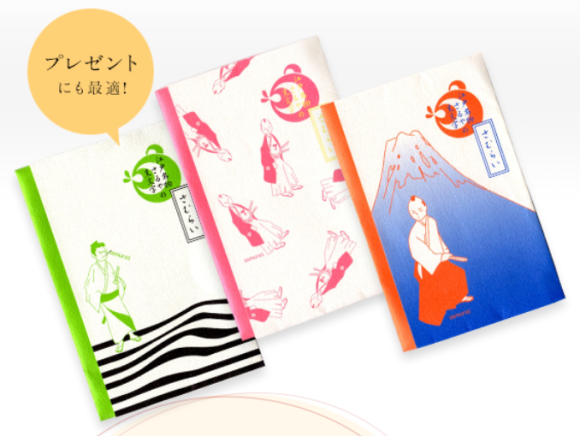
If you watch a lot of samurai movies or TV shows, you might have noticed that a toothpick is about as common a costume accessory as a set of paired swords. The reason isn’t because samurai were particularly fastidious about dental hygiene, though. Many fictional samurai stories re set in the Edo period, when the end of Japan’s centuries of civil war caused the warrior class’ power and prestige to begin slowly but surely eroding.
The samurai were a prideful bunch, though, and were loath to admit the new societal reality that swordsman had suddenly become a far less lucrative profession. So even if they couldn’t afford to regularly fill their stomachs, many would still lodge a toothpick between their teeth to give the impression that they’d just polished off a lavish meal fit for a man of high rank.
Of course, it takes more than just a toothpick to transform yourself into a samurai. You’ll also need to talk the talk, which is why these traditionally made Japanese toothpicks come individually wrapped with period-correct samurai phrases, and even helpful English translations and pronunciation guides.
In Japan, it’s not uncommon to find workshops that have been making lacquerware, dolls, or paper in the same style for generations. But the country only has one dedicated toothpick maker, Tokyo’s Sarurya, which has been selling toothpicks for more than 300 years, or long enough that when the shop first opened the city was still called Edo.
Appropriately enough for a store that’s been around so long, Saruya’s newest product has a playfully historic aspect. Called Samurai Toothpicks, each wooden sliver comes individually wrapped, with each wrapper containing an old-school Japanese phrase from the days when a top-knot was the go-to hairstyle for men.
Saruya is hoping the Samurai Toothpicks appeal not just to Japanese customers with something stuck between their teeth, but also to foreign shoppers with a taste for Japanese history and culture. The Japanese text is accompanied by its Romanized version for easy pronunciation, plus the English translation. In addition to korenite gomen, other phrases include iza mairou (“Let’s go”) and tanomou (“May I come in?”).
It’s not just the language that’s traditional, though, but the toothpicks’ construction as well. Made from spicebush, the picks are of the same style as those used to eat Japanese sweets during tea ceremonies. The material gives them a speckled greenish black color and makes them flexible yet sturdy, and even imparts a pleasant aroma to the toothpicks.
1,026 yen (US$8.20) gets you two packs of 20 picks each. Customers can choose whether they’d like the whole bundle enclosed in the green ronin, red master swordsman, or orange loyal servant design.
If you’re looking for a way to make learning a foreign language interesting, or just a post-meal conversation piece, you can order the Samurai Toothpicks directly from Saruya here and pick up some Japanese while you pick your teeth.
Shop information
Saruya / さるや
Address: Tokyo-to, Chuo-ku, Nihonbashi Muromachi 1-12-5
東京都中央区日本橋室町1-12-5
Open 10 a.m.-6 p.m.
Closed Sundays and holidays
Website
Source: Japaaan
Top images: Saruya (edited by RocketNews24)
Insert images: Saruya

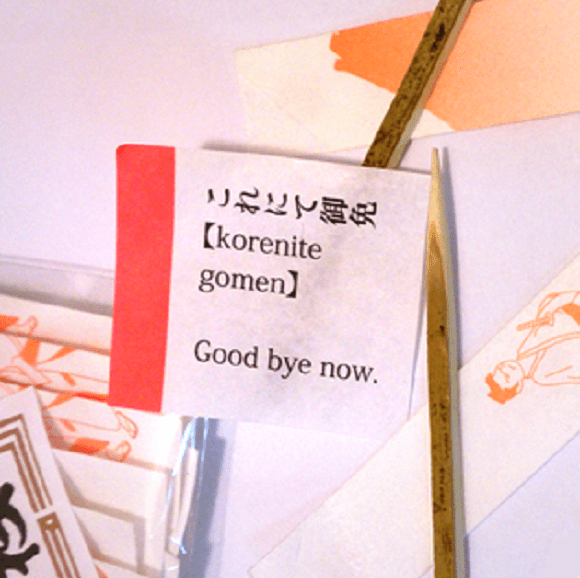
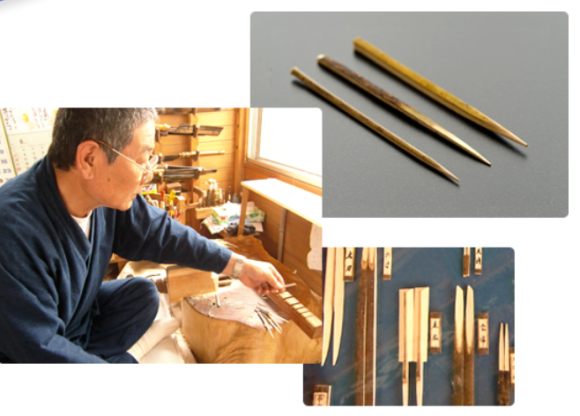
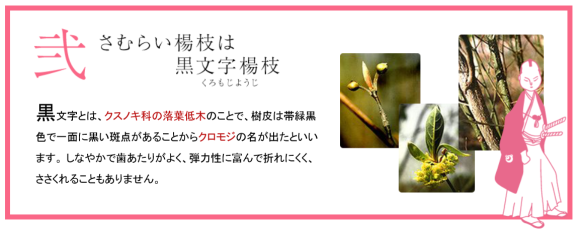
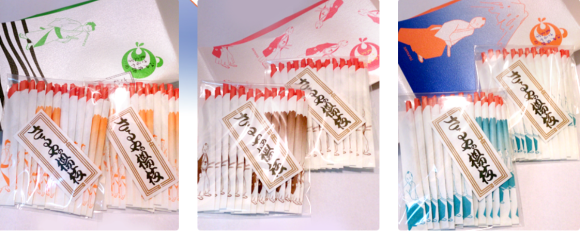
 Japanese drugstore sells onigiri at pre-stupid era prices, but how do they compare to 7-Eleven?
Japanese drugstore sells onigiri at pre-stupid era prices, but how do they compare to 7-Eleven? Japan Extreme Budget Travel! A trip from Tokyo to Izumo for just 30,000 yen [Part 1]
Japan Extreme Budget Travel! A trip from Tokyo to Izumo for just 30,000 yen [Part 1] 7-Eleven Japan’s sakura sweets season is underway right now!
7-Eleven Japan’s sakura sweets season is underway right now! Hey, 2020s kids! The ’90s have a sticker picture message waiting for you in Tokyo
Hey, 2020s kids! The ’90s have a sticker picture message waiting for you in Tokyo Beautiful blue apple jam is taking the Japanese internet’s breath away!
Beautiful blue apple jam is taking the Japanese internet’s breath away! Japanese drugstore sells onigiri at pre-stupid era prices, but how do they compare to 7-Eleven?
Japanese drugstore sells onigiri at pre-stupid era prices, but how do they compare to 7-Eleven? Japan Extreme Budget Travel! A trip from Tokyo to Izumo for just 30,000 yen [Part 1]
Japan Extreme Budget Travel! A trip from Tokyo to Izumo for just 30,000 yen [Part 1] 7-Eleven Japan’s sakura sweets season is underway right now!
7-Eleven Japan’s sakura sweets season is underway right now! Hey, 2020s kids! The ’90s have a sticker picture message waiting for you in Tokyo
Hey, 2020s kids! The ’90s have a sticker picture message waiting for you in Tokyo Beautiful blue apple jam is taking the Japanese internet’s breath away!
Beautiful blue apple jam is taking the Japanese internet’s breath away! Japanese woman stumbles on the power of the infamous “gaijin seat” phenomenon during flight
Japanese woman stumbles on the power of the infamous “gaijin seat” phenomenon during flight The results are in! One Piece World Top 100 characters chosen in global poll
The results are in! One Piece World Top 100 characters chosen in global poll Extreme budget travel! Can you do a good weekend trip to Taiwan with 50,000 yen (US$370)? – Part 2
Extreme budget travel! Can you do a good weekend trip to Taiwan with 50,000 yen (US$370)? – Part 2 7-Eleven Japan starts new temporary luggage storage service in over 300 branches
7-Eleven Japan starts new temporary luggage storage service in over 300 branches Find a red envelope on the ground? Here’s why you should never pick it up
Find a red envelope on the ground? Here’s why you should never pick it up The 10 most annoying things foreign tourists do on Japanese trains, according to locals
The 10 most annoying things foreign tourists do on Japanese trains, according to locals Starbucks Japan releases new sakura goods and drinkware for cherry blossom season 2026
Starbucks Japan releases new sakura goods and drinkware for cherry blossom season 2026 Is Sapporio’s Snow Festival awesome enough to be worth visiting even if you hate the snow? [Pics]
Is Sapporio’s Snow Festival awesome enough to be worth visiting even if you hate the snow? [Pics] Japan has trams that say “sorry” while they ride around town…but why?
Japan has trams that say “sorry” while they ride around town…but why? Tokyo Skytree turns pink for the cherry blossom season
Tokyo Skytree turns pink for the cherry blossom season Highest Starbucks in Japan set to open this spring in the Tokyo sky
Highest Starbucks in Japan set to open this spring in the Tokyo sky Japan’s new “Cunte” contact lenses aren’t pronounced like you’re probably thinking they are
Japan’s new “Cunte” contact lenses aren’t pronounced like you’re probably thinking they are Shibuya Station’s Hachiko Gate and Yamanote Line stairway locations change next month
Shibuya Station’s Hachiko Gate and Yamanote Line stairway locations change next month Yakuzen ramen restaurant in Tokyo is very different to a yakuza ramen restaurant
Yakuzen ramen restaurant in Tokyo is very different to a yakuza ramen restaurant Starbucks Japan adds new sakura Frappuccino and cherry blossom drinks to the menu
Starbucks Japan adds new sakura Frappuccino and cherry blossom drinks to the menu Japan’s newest Shinkansen has no seats…or passengers [Video]
Japan’s newest Shinkansen has no seats…or passengers [Video] Foreigners accounting for over 80 percent of off-course skiers needing rescue in Japan’s Hokkaido
Foreigners accounting for over 80 percent of off-course skiers needing rescue in Japan’s Hokkaido Super-salty pizza sends six kids to the hospital in Japan, linguistics blamed
Super-salty pizza sends six kids to the hospital in Japan, linguistics blamed Starbucks Japan unveils new sakura Frappuccino for cherry blossom season 2026
Starbucks Japan unveils new sakura Frappuccino for cherry blossom season 2026 Foreign tourists in Japan will get free Shinkansen tickets to promote regional tourism
Foreign tourists in Japan will get free Shinkansen tickets to promote regional tourism Take a trip to Japan’s Dododo Land, the most irritating place on Earth
Take a trip to Japan’s Dododo Land, the most irritating place on Earth Naruto and Converse team up for new line of shinobi sneakers[Photos]
Naruto and Converse team up for new line of shinobi sneakers[Photos] Is China’s don’t-go-to-Japan warning affecting the lines at a popular Tokyo gyukatsu restaurant?
Is China’s don’t-go-to-Japan warning affecting the lines at a popular Tokyo gyukatsu restaurant? Survey asks foreign tourists what bothered them in Japan, more than half gave same answer
Survey asks foreign tourists what bothered them in Japan, more than half gave same answer Japan’s human washing machines will go on sale to general public, demos to be held in Tokyo
Japan’s human washing machines will go on sale to general public, demos to be held in Tokyo Starbucks Japan releases new drinkware and goods for Valentine’s Day
Starbucks Japan releases new drinkware and goods for Valentine’s Day We deeply regret going into this tunnel on our walk in the mountains of Japan
We deeply regret going into this tunnel on our walk in the mountains of Japan Studio Ghibli releases Kodama forest spirits from Princess Mononoke to light up your home
Studio Ghibli releases Kodama forest spirits from Princess Mononoke to light up your home Major Japanese hotel chain says reservations via overseas booking sites may not be valid
Major Japanese hotel chain says reservations via overseas booking sites may not be valid Put sesame oil in your coffee? Japanese maker says it’s the best way to start your day【Taste test】
Put sesame oil in your coffee? Japanese maker says it’s the best way to start your day【Taste test】 No more using real katana for tourism activities, Japan’s National Police Agency says
No more using real katana for tourism activities, Japan’s National Police Agency says Japanese woman stumbles on the power of the infamous “gaijin seat” phenomenon during flight
Japanese woman stumbles on the power of the infamous “gaijin seat” phenomenon during flight The results are in! One Piece World Top 100 characters chosen in global poll
The results are in! One Piece World Top 100 characters chosen in global poll Extreme budget travel! Can you do a good weekend trip to Taiwan with 50,000 yen (US$370)? – Part 2
Extreme budget travel! Can you do a good weekend trip to Taiwan with 50,000 yen (US$370)? – Part 2 7-Eleven Japan starts new temporary luggage storage service in over 300 branches
7-Eleven Japan starts new temporary luggage storage service in over 300 branches Find a red envelope on the ground? Here’s why you should never pick it up
Find a red envelope on the ground? Here’s why you should never pick it up Cup Noodle mystery meat instant rice returns to Japanese stores after a seven-year absence
Cup Noodle mystery meat instant rice returns to Japanese stores after a seven-year absence Reflecting on an old red-light district in Tokyo as another landmark closes its doors forever
Reflecting on an old red-light district in Tokyo as another landmark closes its doors forever Can you eat lunch in Tokyo for less than 500 yen?
Can you eat lunch in Tokyo for less than 500 yen? We followed Tokyo’s mystery walking map and ended up creating our own bar-hopping adventure
We followed Tokyo’s mystery walking map and ended up creating our own bar-hopping adventure Saitama is home to the best strawberries in Japan that you’ve probably never even heard of
Saitama is home to the best strawberries in Japan that you’ve probably never even heard of This themed Starbucks in Seoul is hidden away in possibly the coolest location ever
This themed Starbucks in Seoul is hidden away in possibly the coolest location ever Japan’s Top 10 Scenic Train Trips–according to two “densha otaku” train guides
Japan’s Top 10 Scenic Train Trips–according to two “densha otaku” train guides It’s illegal for yakuza to go to professional baseball games in Japan, Tokyo arrests remind us
It’s illegal for yakuza to go to professional baseball games in Japan, Tokyo arrests remind us